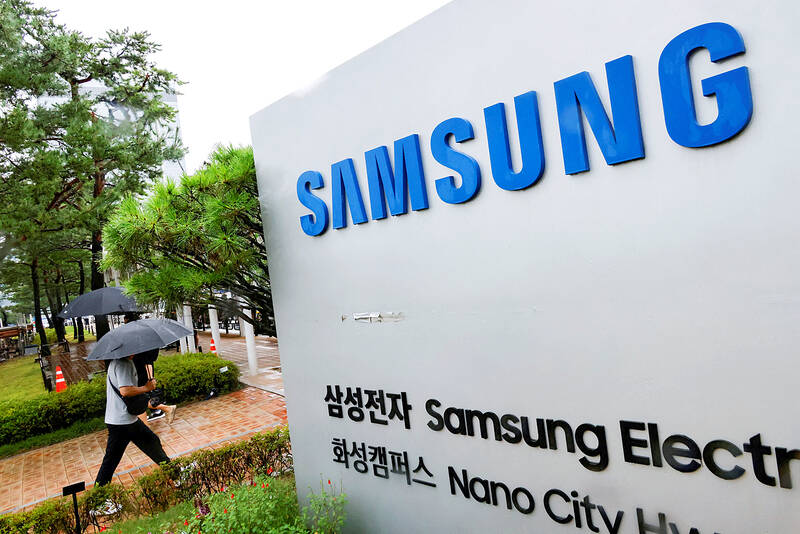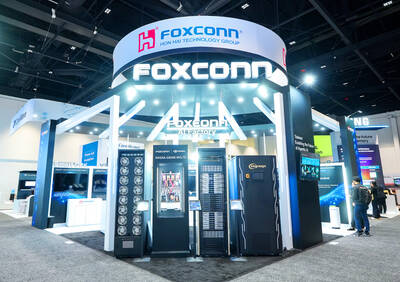South Korean exports have lost momentum so far this month, dimming this year’s outlook for an economy overshadowed by political turmoil and the potential impact of US President Donald Trump’s tariff plans.
The value of shipments adjusted for working-day differences decreased 2.7 percent from a year earlier for this month, data released yesterday by the customs office showed. That contrasts with a 7.7 percent rise initially reported for last month.
In headline figures distorted by more working days compared with last year, exports grew 16 percent, while overall imports increased 7.7 percent, resulting in a trade surplus of US$804 million. The Lunar New Year holidays came in January this year, whereas a year earlier they were in February.

Photo: Reuters
Exports to the US rose 16 percent and those to China increased 13.6 percent, according to customs data unadjusted for calendar differences.
Semiconductor shipments grew 22.1 percent, while automobile exports increased 40.3 percent.
Exports represent the biggest component of South Korea’s economy, led by shipments of semiconductors. A global rush to develop artificial intelligence technology has been a boon for companies such as SK Hynix Inc and Samsung Electronics Co that produce advanced memory chips.
Their outlook is turning increasingly gloomy after Trump unveiled a series of tax initiatives following his inauguration last month. The risk of a global trade war has become dangerously real after the president announced 25 percent levies on steel and aluminum imports that are to take effect next month, and reciprocal tariffs on numerous trading partners that are expected to hit in April.
“The uncertainty is extremely high and the primary cause is the impact of Trump’s tariff policies on [South] Korea’s export industries,” Korea Economic Research Institute researcher Lee Seung-suk said. “There are considerable concerns in sectors like steel and automobiles. Unless there are measures to ease the tariffs, a decline in exports this year seems inevitable.”
The trade risks add to concerns for an economy hamstrung by stagnant consumption and political turmoil that have weighed on consumer confidence. After suspended South Korean president Yoon Suk-yeol imposed martial law briefly in December last year, he was arrested on charges of insurrection, and the South Korean Constitutional Court is deliberating whether to finalize his ouster.
South Korea’s deputy trade minister visited Washington this week and asked the US to exclude his country from its tariff plans, a government statement said.
He highlighted a free-trade agreement in place between the two nations and stressed investments South Korea has made in the US, it said.
With headwinds for the economy intensifying, the Bank of Korea (BOK) last month cut its growth forecast for this year. The central bank’s board is set to meet for an interest rate decision next week. The BOK pivoted to an easing cycle with a rate cut in October last year and followed that with another reduction in November.
Weak export growth is a concern for the central bank given the economy’s heavy reliance on trade. South Korean companies are widely embedded across global supply chains, including automobiles, rechargeable batteries, shipbuilding and refined oil.

Anna Bhobho, a 31-year-old housewife from rural Zimbabwe, was once a silent observer in her home, excluded from financial and family decisionmaking in the deeply patriarchal society. Today, she is a driver of change in her village, thanks to an electric tricycle she owns. In many parts of rural sub-Saharan Africa, women have long been excluded from mainstream economic activities such as operating public transportation. However, three-wheelers powered by green energy are reversing that trend, offering financial opportunities and a newfound sense of importance. “My husband now looks up to me to take care of a large chunk of expenses,

SECTOR LEADER: TSMC can increase capacity by as much as 20 percent or more in the advanced node part of the foundry market by 2030, an analyst said Taiwan Semiconductor Manufacturing Co (TSMC, 台積電) is expected to lead its peers in the advanced 2-nanometer process technology, despite competition from Samsung Electronics Co and Intel Corp, TrendForce Corp analyst Joanne Chiao (喬安) said. TSMC’s sophisticated products and its large production scale are expected to allow the company to continue dominating the global 2-nanometer process market this year, Chiao said. The world’s largest contract chipmaker is scheduled to begin mass production of chips made on the 2-nanometer process in its Hsinchu fab in the second half of this year. It would also hold a ceremony on Monday next week to

State-run CPC Corp, Taiwan (CPC, 台灣中油) yesterday signed a letter of intent with Alaska Gasline Development Corp (AGDC), expressing an interest to buy liquefied natural gas (LNG) and invest in the latter’s Alaska LNG project, the Ministry of Economic Affairs said in a statement. Under the agreement, CPC is to participate in the project’s upstream gas investment to secure stable energy resources for Taiwan, the ministry said. The Alaska LNG project is jointly promoted by AGDC and major developer Glenfarne Group LLC, as Alaska plans to export up to 20 million tonnes of LNG annually from 2031. It involves constructing an 1,290km

NEXT GENERATION: The company also showcased automated machines, including a nursing robot called Nurabot, which is to enter service at a Taichung hospital this year Hon Hai Precision Industry Co (鴻海精密) expects server revenue to exceed its iPhone revenue within two years, with the possibility of achieving this goal as early as this year, chairman Young Liu (劉揚偉) said on Tuesday at Nvidia Corp’s annual technology conference in San Jose, California. AI would be the primary focus this year for the company, also known as Foxconn Technology Group (富士康科技集團), as rapidly advancing AI applications are driving up demand for AI servers, Liu said. The production and shipment of Nvidia’s GB200 chips and the anticipated launch of GB300 chips in the second half of the year would propel